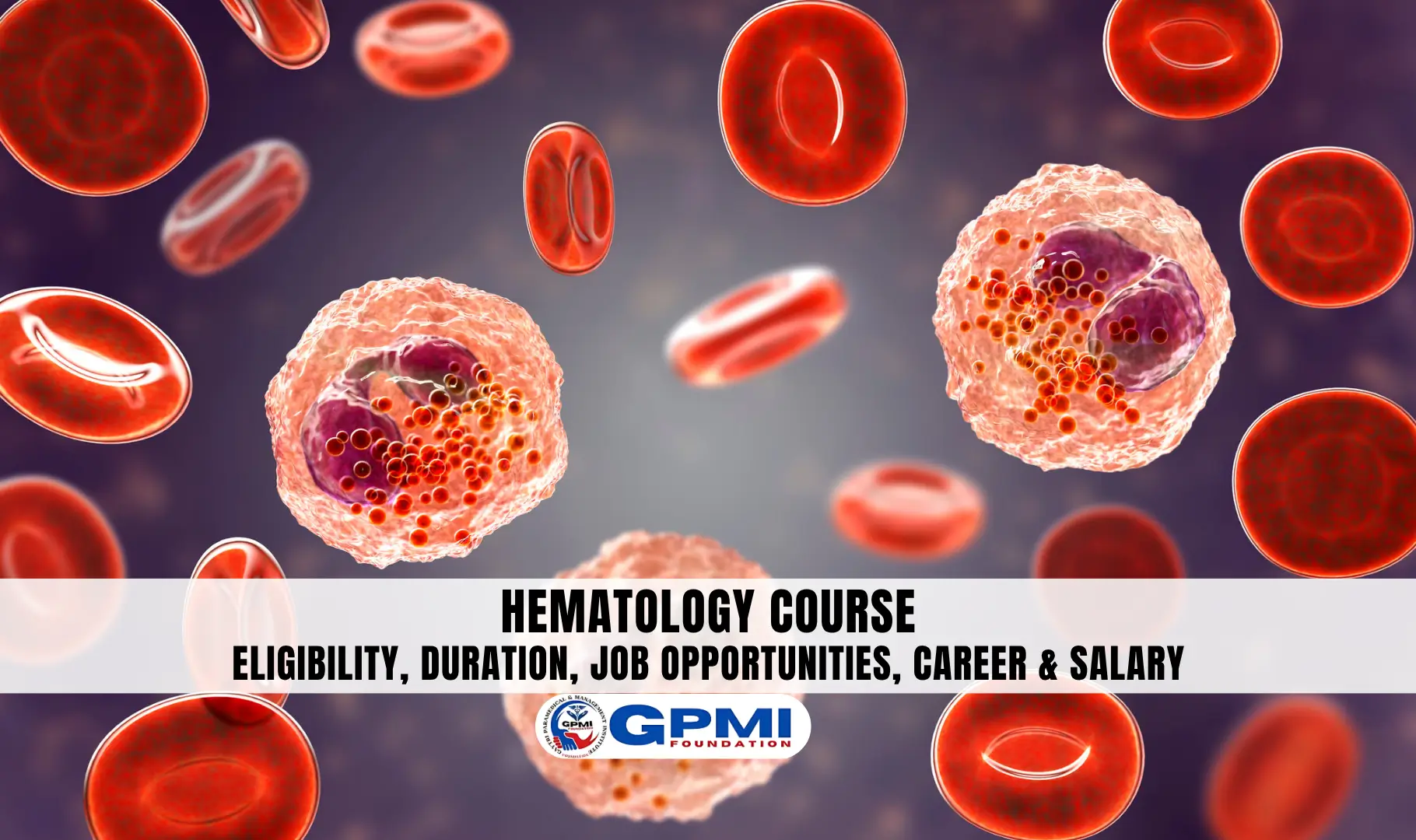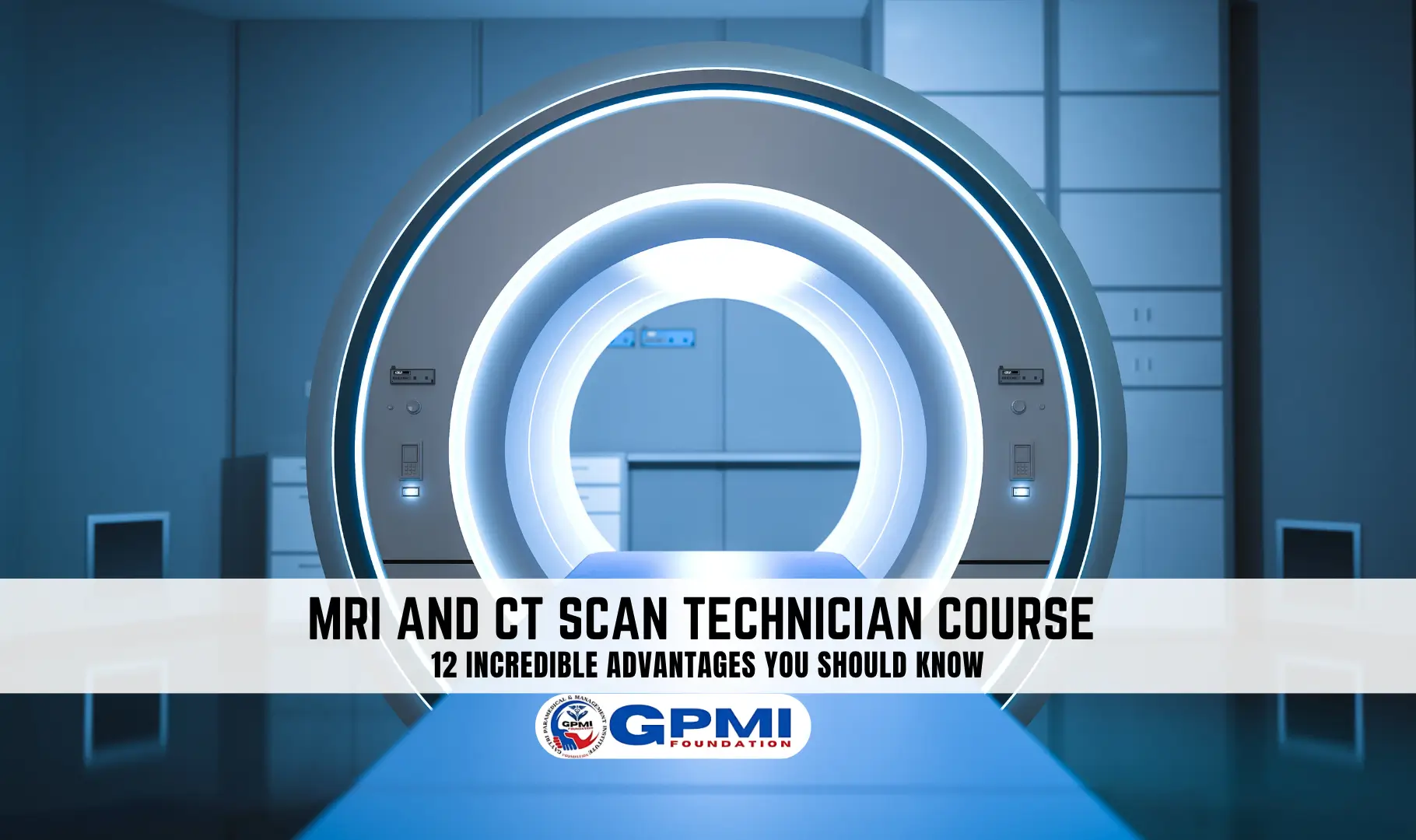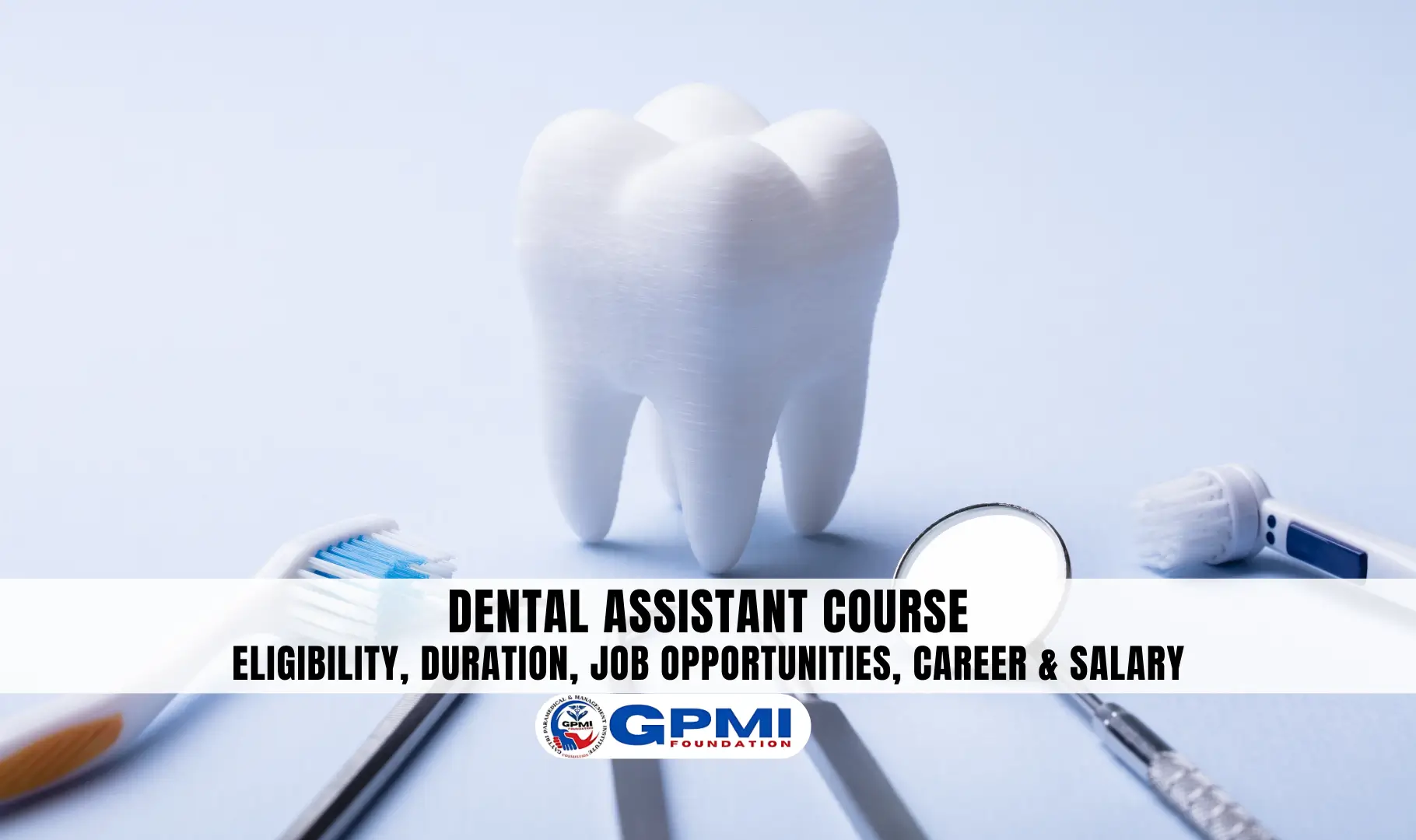Choosing the right course after 12th can be confusing for many students, especially those from the science stream. If you are interested in working in the medical field but don’t want to spend many years studying, a Diploma in Healthcare can be a smart choice.
It is a job-focused course that teaches you the basic skills needed to work in hospitals, clinics, labs, or emergency services. The best part is that you can complete this course in just 1 or 2 years and start earning early.
It is a great option for students who want a stable career, good salary, and respect in society. Many roles like medical lab technician, nursing assistant, and emergency medical technician can be learned through healthcare diplomas.
In this article, we will explain the top 10 reasons why doing a Diploma in Healthcare after 12th can open many doors for your future.
Table of Contents
What is Diploma in Healthcare Management?
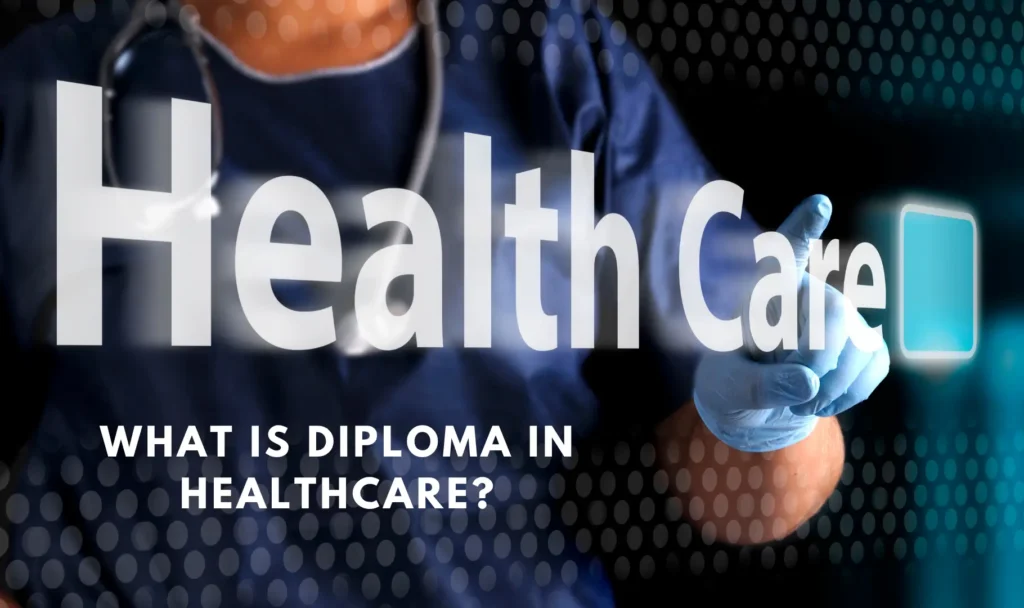
A Diploma in Healthcare is a short-term course that trains students to work in the medical and health field. This course is usually 1 to 2 years long and can be done after passing class 10th or 12th, depending on the type of diploma.
It is designed for students who want to work in hospitals, clinics, labs, or healthcare centers but do not want to study long courses like MBBS or B.Sc. Nursing.
In this diploma, students learn about basic medical skills, patient care, first aid, lab testing, and how to use medical tools. Some popular diploma options include Medical Lab Technology (DMLT), Nursing Assistant, Dialysis Technology, and Emergency Medical Technician (EMT). The course includes both classroom learning and hands-on training in real medical settings.
After completing the Diploma in Healthcare, students can start working in hospitals, private labs, or even do home health services. It’s a good way to start a career in healthcare without spending too much time or money.
Top Diploma Courses in Healthcare
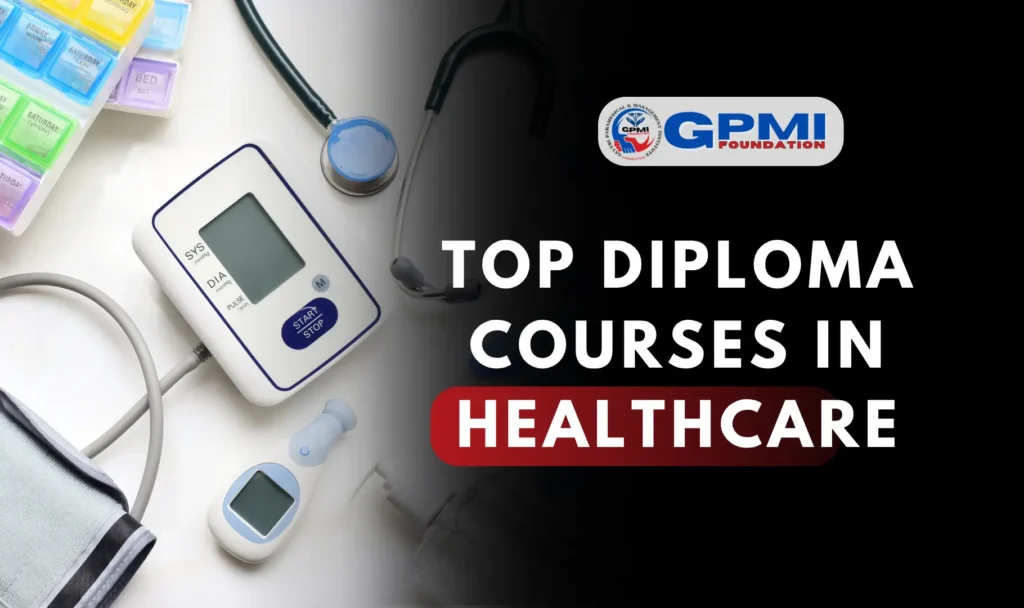
There are many diploma courses in healthcare that help students start a medical career quickly after 10th or 12th. These courses are job-oriented and offer practical training in different areas of healthcare. Below are some of the top diploma courses in healthcare that are popular among students:
Diploma in Medical Lab Technology (DMLT)
Diploma in Medical Lab Technology (DMLT) is one of the most popular healthcare diploma courses in India. This course trains students to work as lab technicians in hospitals, diagnostic centers, and pathology labs. The duration of the course is usually 1 to 2 years, and students can join it after completing 10th or 12th class, depending on the institute’s requirement.
In this course, students learn how to collect blood, urine, and other body samples. They are trained to perform tests, handle lab equipment, and prepare medical reports that help doctors diagnose diseases. It is a job-oriented course with good demand in both private and government healthcare sectors.
- Course Duration: 1 or 2 years
- Eligibility: 10th or 12th pass (science preferred)
- Skills Learned: Sample collection, testing, lab safety, report preparation
- Career Options: Lab Technician, Pathology Assistant, Lab Supervisor
- Work Areas: Hospitals, Clinics, Private Labs, Blood Banks
DMLT is a great option for students who want to start working early and grow in the medical field.
Diploma in Nursing Care Assistant
The Diploma in Nursing Care Assistant is a healthcare diploma that trains students to help patients with basic care in hospitals, nursing homes, and home care settings.
This course is ideal for those who want to work in the nursing field but do not have the time or money to study for long-term degrees. The course usually lasts for 1 to 2 years, and students can join after passing 10th or 12th class.
In this diploma, students learn how to take care of patients’ daily needs like bathing, feeding, dressing, giving medicines, and checking vital signs like blood pressure and temperature.
They are also taught how to handle elderly or disabled patients with care and compassion. Nursing assistants play an important role in making patients feel comfortable and cared for.
- Duration: 1 to 2 years
- Eligibility: 10th pass or 12th pass
- Skills: Patient care, hygiene, medication support, vital checks
- Jobs: Nursing Assistant, Home Care Assistant, Hospital Attendant
- Workplaces: Hospitals, Nursing Homes, Old Age Homes, Home Healthcare
This course is perfect for students who want to work closely with patients and help them heal.
Diploma in Dialysis Technology
The Diploma in Dialysis Technology is a healthcare course that trains students to operate dialysis machines and take care of patients suffering from kidney failure. Dialysis is a medical process where a machine filters and cleans the blood when the kidneys stop working properly. This diploma course is usually 1 to 2 years long, and students who have completed 12th with science stream can apply.
In this course, students learn how to prepare the dialysis machine, monitor the patient during the procedure, check blood pressure and other vital signs, and handle any emergencies. They also learn how to clean and store dialysis equipment and how to maintain hygiene to prevent infections.
- Duration: 1 to 2 years
- Eligibility: 12th pass with Science (Physics, Chemistry, Biology)
- Skills: Operating dialysis machines, patient care, hygiene, emergency handling
- Job Roles: Dialysis Technician, Dialysis Assistant, Renal Care Technician
- Work Areas: Hospitals, Kidney Care Centers, Dialysis Clinics
This course offers good job opportunities in the growing field of kidney care and allows students to build a respectful and stable career in the healthcare industry. Students from other streams also can apply for Vocational Dialysis Technology Course.
Diploma in Radiology and Imaging Technology
The Diploma in Radiology and Imaging Technology is a specialized healthcare diploma that trains students to use imaging machines like X-rays, CT scans, and MRIs to help doctors detect diseases and injuries. This course is usually 1 to 2 years long and can be pursued after completing 12th with science (Physics, Chemistry, Biology).
During the course, students learn how to operate radiology equipment, take clear and safe images of internal body parts, and follow safety rules to protect themselves and patients from radiation. They are also taught how to assist radiologists, maintain imaging records, and handle patients during procedures.
- Duration: 1 to 2 years
- Eligibility: 12th pass with Science (PCB)
- Skills Learned: X-ray & CT scan operation, MRI handling, radiation safety, patient positioning
- Job Roles: X-ray Technician, Radiology Assistant, Imaging Technician
- Work Areas: Hospitals, Diagnostic Centers, Imaging Clinics, Private Labs
This diploma is perfect for students who are interested in working with machines and want a stable, respected job in the medical imaging field.
Emergency Medical Technician (EMT)
An Emergency Medical Technician (EMT) is a trained healthcare worker who provides emergency medical care to patients before they reach the hospital.
The EMT diploma course is usually 6 months to 1 year long and is ideal for students who have completed 10th or 12th, especially with a science background. EMTs are often the first responders in road accidents, heart attacks, injuries, or medical emergencies at home or public places.
In this course, students learn how to provide first aid, CPR, handle bleeding or fractures, use oxygen cylinders, and manage patients during ambulance transport. They are trained to stay calm in emergencies and save lives by giving immediate care.
- Duration: 6 months to 1 year
- Eligibility: 10th or 12th pass (Science preferred)
- Skills Learned: First aid, CPR, patient transport, use of emergency tools
- Job Roles: EMT, Ambulance Assistant, Emergency Responder
- Work Areas: Ambulance Services, Hospitals, Disaster Relief Teams, Fire Services
This course is best for students who want to serve people and be a real-life hero in critical situations.
Top 10 Reasons to Pursue a Diploma in Healthcare

Choosing the right course after school is one of the most important decisions in a student’s life. While many students dream of becoming doctors or nurses, not everyone can afford or wait for a long 4–5 year degree.
This is where Diploma in Healthcare becomes a smart and practical option. It offers the chance to enter the medical field faster, with hands-on training and good job opportunities. Here are the top 10 reasons why pursuing a Diploma in Healthcare could be a smart decision for your future:
1. Short Duration and Quick Career Start
Most diploma courses in healthcare can be completed within 1 to 2 years, which is much shorter compared to degree programs like MBBS or B.Sc. Nursing that take 4 to 5 years. This shorter duration offers several key advantages:
- Quick Entry into the Job Market – You can start working earlier than degree holders.
- Early Financial Independence – Begin earning at a younger age to support yourself or your family.
- Hands-On Experience – Gain real-world practical skills while others are still studying.
- Lower Education Costs – Shorter courses often mean lower fees, saving money and time.
This makes healthcare diplomas an ideal choice for students who are career-focused, budget-conscious, and eager to start their professional journey without delay.
2. Affordable Education Option
One of the biggest advantages of pursuing a Diploma in Healthcare is that it offers an affordable education option compared to long-term medical degrees. Many students who want to enter the healthcare field cannot afford the high fees of MBBS, B.Sc. Nursing, or other professional courses.
Diploma courses usually have lower tuition fees, shorter duration, and don’t require expensive coaching or entrance exam preparation. This makes them a great choice for students from middle- or low-income families who want to build a career in the medical field without financial burden.
- Lower course fees than degree programs
- No need for expensive coaching or NEET exam
- Shorter duration reduces living and travel costs
- Scholarships may also be available in some institutes
With a healthcare diploma, students can get quality education at a lower cost and quickly move toward a stable and rewarding career.
3. Job-Oriented and Skill-Based Training
Diploma in healthcare courses are specially designed to focus more on practical skills rather than just classroom theory. Students learn how to operate medical equipment, collect and test samples, assist doctors and nurses, and manage patients with care and safety.
This skill-based training helps students become job-ready immediately after completing the course, without needing long internships or extra certifications. The focus is on learning by doing, which builds confidence and prepares students for real-world challenges in the medical field.
- Practical training in labs, hospitals, or healthcare centers
- Learn to handle medical tools, machines, and patient care
- Skill-based education helps in quick job placements
- Students are trained for actual hospital or clinic duties
- Increases employability in both private and government sectors
These courses are perfect for students who want to start working quickly and build a strong career with real medical skills.
4. High Demand in the Healthcare Industry
India’s healthcare sector is expanding quickly, creating a high demand for trained and skilled professionals. Hospitals, diagnostic labs, nursing homes, and private clinics are always looking for support staff who can assist doctors and medical teams.
Diploma holders such as lab technicians, dialysis technicians, radiology assistants, and emergency medical technicians (EMTs) are needed across urban and rural areas.
- Growing need for healthcare workers in India
- High demand for trained diploma holders
- Opportunities in both public and private sectors
- Diploma courses offer faster entry into the field
A Diploma in Healthcare helps students step into this growing industry with confidence and the right skills.
5. Multiple Course Options to Choose From
Healthcare diplomas are not limited to just one area. There are many different courses that students can choose based on their interest. Some popular options include:
- DMLT (Diploma in Medical Lab Technology)
- Diploma in Nursing Care Assistant
- Diploma in Dialysis Technology
- Diploma in Radiology and Imaging Technology
- Emergency Medical Technician (EMT)
- Diploma in Operation Theatre Technology
Each of these courses focuses on a specific role in the medical field, giving students the freedom to choose what suits them best.

6. Good Salary and Growth Opportunities
Here students can earn good starting salaries after placement. For example, a fresh DMLT graduate can begin with a monthly income of ₹10,000 to ₹20,000. With 2–3 years of experience, skilled technicians may earn up to ₹30,000–₹50,000 or more, depending on their role and workplace.
- Good starting salary even for diploma holders
- Income increases with skills and experience
- Growth opportunities through promotions or specialization
- Option to pursue further studies like advanced diplomas or degrees
The healthcare field offers stable income, regular growth, and long-term career security, making it a smart choice for students looking for both purpose and earning potential.
7. Work in Various Medical Setups
After completing a diploma in healthcare, students are not limited to just hospitals. They can find jobs in:
- Private Clinics
- Government Hospitals
- Diagnostic Labs
- Blood Banks
- Home Healthcare Services
- Ambulance Services
- Old Age Homes
- NGOs and Emergency Services
This wide range of work areas gives students more chances to get hired and choose a comfortable work environment.
8. Work Both in India and Abroad
Healthcare workers are highly respected across the globe, and many countries are facing a shortage of skilled medical staff. Trained technicians from India are in demand, especially in roles like lab technicians, dialysis experts, and radiology assistants.
A diploma in healthcare can open up opportunities to work abroad after gaining some local experience. It also acts as a stepping stone for students who wish to pursue higher studies or certifications overseas.
- High global demand for healthcare technicians
- Opportunity to work abroad after gaining experience
- Pathway to international certifications and courses
- Better salary and lifestyle in foreign healthcare systems
With the right skills and training, a diploma holder can build a successful international healthcare career.
9. Suitable for Girls and Boys
Diploma courses in healthcare are ideal for both male and female students, offering equal opportunities and growth. Many girls prefer roles like nursing care assistant and medical lab technician, which involve patient care and sample testing.
Boys often choose fields like radiology, dialysis technology, and emergency medical technician (EMT) services, where they work with machines and respond to emergencies.
- Equal opportunity for both genders
- Girls prefer lab and patient care roles
- Boys thrive in technical and emergency services
- Safe, stable, and respected profession
These healthcare diploma courses provide a secure and respectful career path for students from all backgrounds.
10. A Respectful Career Path
Working in the healthcare sector is not just a job—it’s a way to serve humanity. Whether you’re assisting in patient care, performing lab tests for diagnosis, or providing emergency treatment, your role directly impacts lives.
People trust and respect healthcare workers for their dedication and care. A diploma in healthcare gives you the skills to make that difference.
- Helps in saving lives and supporting patients
- Builds a sense of purpose and social respect
- Earn respect while making a meaningful impact
- Healthcare workers are valued in every community
With this career, you don’t just earn money—you earn gratitude, trust, and honor from society.
Conclusion
A Diploma in Healthcare make you a healthcare technologist and it is a golden opportunity for students who are looking for a short-term, low-cost, and job-ready career in the medical field. With practical skills, wide job options, and chances to grow further, these courses are perfect for today’s students who want stability and early success.
Whether you dream of working in a hospital, lab, or ambulance, a healthcare diploma can help you enter the world of medicine without delay. It’s a career full of learning, service, and satisfaction.
If you’re someone who wants to make a difference and start a respected career quickly, a Diploma in Healthcare after 12th is a smart choice that can change your life.



